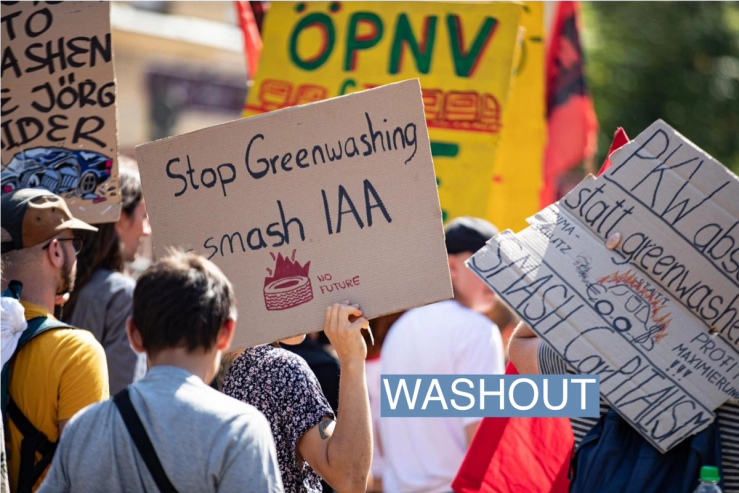The Scoop
A crackdown on greenwashing is coming.
Global regulators are increasingly turning their attention to allegations of misleading climate advertising, and warn action is imminent.
Top officials in both the U.K. and Australia separately told Semafor that they were readying new legal frameworks and punishments for companies found guilty of greenwashing.
The head of investigations at Britain’s advertising watchdog said his office was holding “live discussions” with the government and the country’s antitrust regulator to outline rules defining how businesses could use terms such as carbon neutral and net zero in their advertising and corporate statements. The U.K.’s Advertising Standards Authority will also make a focus on climate change a multi-year priority in a new strategy to be published next month, Miles Lockwood added.
Australia’s joint antitrust and advertising watchdog, meanwhile, plans to issue its first “enforcement action” against companies for greenwashing violations in early 2024, Gina Cass-Gottlieb, the chair of the Australian Competition and Consumer Commission said, though she did not say what that action would entail.
“There is a lot of very valuable engagement between the consumer protection enforcement agencies worldwide,” Cass-Gottlieb said. “There is a very close focus on this.”
Prashant’s view
The core question over greenwashing is one of language.
What does it mean to be “carbon neutral” or to have a “net zero” plan — aside from making time to read this newsletter? Even “greenwashing” doesn’t have a precise definition. In recent conversations with analysts, officials, and sources, I’ve often had to pause interviews to clearly outline what we each understand by the terms we’re discussing. Not all of them have universally agreed-upon definitions, even within broad climate circles, and those that do often come with caveats or require additional explanation.
Can you only be “net zero,” for example, if your carbon emissions are, in fact, zero? What if you maintain your carbon emissions at their current level, but purchase an equivalent value of carbon-removal credits or offsets? What if you’re somewhere in between? If those in the climate-focused business, journalistic, and governmental community cannot agree, how can everyday consumers be expected to understand the terms?
Enter the regulators. Multiple surveys indicate both that consumers lack a deep understanding of the terminology companies use in their advertising, and that businesses make green claims they cannot back up: A European Commission study in 2020 found that more than half of all examined environmental claims were vague, misleading, or unfounded.
Across the rich world, watchdogs are taking notice, and beginning to police the precise language companies use to describe their emissions-cutting and environmental efforts.
And in this case, the words being used — or misused — have a real-world impact: research published in Harvard Business Review last year examining more than 200 publicly traded large U.S. companies found that firms perceived by their customers to be greenwashing have markedly lower customer-satisfaction scores, and were linked to lower earnings per share and reduced return on investment. (Interestingly, this applied less to companies with products perceived to be of higher quality.)
Quotable
“We’re calling time on this idea that you can just go out there and just make any old nonsense green claim about your products or services with impunity, because we do need to enforce the level playing field here.”
— Miles Lockwood, Director of Complaints and Investigations, U.K. Advertising Standards Authority
Know More
To some extent, this is merely the latest stage in a long-running and wide-ranging battle being fought by regulators around the world, including in the U.K. and Australia. Lockwood pointed out to me that in 2007, the oil and gas giant Shell was barred by the ASA from running a press ad that showed refinery chimneys emitting flowers, describing it as “conceptual and fanciful.”
British lawmakers are considering a new law that would fine companies up to 10% of their global revenue for green claims that breach consumer rules, while the country’s financial-markets regulator is mulling regulations targeting greenwashing in investment documents.
Australia’s securities watchdog ASIC has also been policing greenwashing, announcing in November 2022 that it would make it an enforcement priority and launching its first legal action in February this year. “We must maintain high standards of governance and disclosure today, and ASIC will not overlook current misconduct — including greenwashing,” its chair said in a June speech.
The View From The EU
The European Union — often described as a “regulatory superpower” — is also flexing its muscles when it comes to clamping down on greenwashing. Last month, it agreed new rules, to come into effect by 2026, that ban sweeping environmental claims such as “climate neutral” or which use the prefix “eco,” unless they are supported by substantial evidence. The U.S., meanwhile, is taking its own steps, with the Securities and Exchange Commission adopting rules last month taking aim at misleading climate marketing practices by investment funds.
Room for Disagreement
The growing regulatory push has triggered a backlash, particularly among conservative politicians in Europe who argue that rules are unnecessarily burdensome, particularly for small businesses which lack the legal wherewithal to ensure they are in the clear before making environmental claims. The issue is likely to become even more prominent as European Parliament elections due in June near.
Cass-Gottlieb herself acknowledged that the ACCC was trying to offer plenty of guidance to businesses before taking legal action because she didn’t want small- and medium-sized businesses “to be reluctant to make claims … because our underlying objective is that the companies and businesses that are making genuine investments in improving their production and distribution processes are able to have confidence to make genuine claims.”
Notable
- Countries worldwide are policing greenwashing in different ways. In a research note published last month, the law firm Gowling WLG outlined how businesses — and regulators — are approaching the issue in China, Canada, France, and Singapore.
- During the men’s soccer World Cup last year, Semafor dug into Qatar’s claim that the tournament was “carbon neutral.” Climate experts were skeptical.
- Australia withdrew a government carbon-neutral certification for a British tobacco company this week, after health officials complained that it aided greenwashing and gave a misleading impression that the company’s cigarettes were less harmful.


